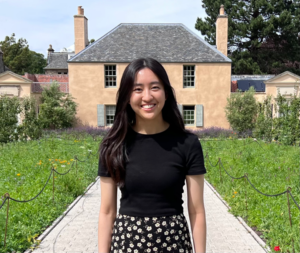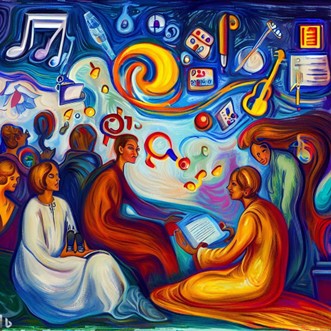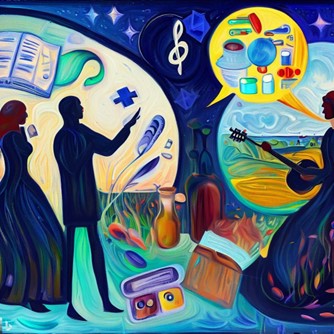Adam Rathbone (Lecturer)
School of Pharmacy
Faculty of Medical Sciences
What did you do?
We used a blended-learning approach (two virtual seminars, self-directed learning, virtual learning environments, virtual clinics) to deliver the four-stage intergroup dialogue method to enhance cultural competence.
Who is involved?
The exchange was a collaboration between Dr Meganne Masko, Assistant Professor in Music Therapy at Indiana University – Purdue University Indiana (IUPUI) in the United States and Dr Adam Pattison Rathbone, Lecturer in Social and Clinical Pharmacy, Newcastle University in the UK. The exchange offered third year Music Therapy students from IUPUI and third year Pharmacy students from Newcastle University an opportunity to enhance their cultural competence by learning with and about approaches to communication across different cultures and sensitivities.

Hayley Chan, a student who participated in the virtual exchange
How did you do it?
Our Director of Education provided the opportunity for the collaboration after being approach by the International Office. The International Office set up our first meeting to make introductions to colleagues at IUPUI. We then met monthly to design and develop teaching materials and delivered these in Semester 1.
We recruited students into the programme by advertising it as a voluntary opportunity to develop cultural competence and expand their networks internationally. We held the first session online via Zoom and introduced the students to an app called Discord, which is similar to Teams but a little bit more flexible. Each week we uploaded self-directed materials for students to work through independently, as well as holding virtual clinics, sending group chat messages on Discord and building relationships between students and staff.
Activity 1 focused on creating meaning through the ‘culture box’ exercise, where students select three items that are symbolic of their culture and describe these items and why they are important to the group.
Activity 2 focuses on explore the identity of others by examining the relationship between different social groups.
Activity 3 explored how conflict is represented in different cultures and encourage students to share stories of conflict from their own family, social or work lives included experiences of stigma, taboo or other conflict linked to their own cultural identity.
Activity 4 examined allyship, what the characteristics and types of allyship are in different settings.
Activity 5 introduced the concept of dialogue, as different to debate and discussion, and students synthesised their learning to practice identifying meaning, respecting identity, dealing with conflict and practising allyship in an intergroup dialogue about a contentious subject using group chat.
Activity 6 included a virtual synchronous session to conduct another intergroup dialogue which enabled students to demonstrate their ability to put their learning in to practice. Students also completed a short reflection exercise which they shared with the programme leads and were also encouraged to submit to the Open Badge Academy.
Why did you do it?
We are committed to decolonising the curriculum to enhance student experiences and enhancing graduates cultural competence to reduce health inequity. A key part of this learning was about how to talk about contentious or sensitive issues with different groups of people from different cultural backgrounds. Using the intergroup dialogue method within a virtual exchange, provided an opportunity for our students to develop their communication skills and cultural competence, whilst using a robust method at IUPUI and expanding their international networks.
Students gained experience of working collaboratively on a digital platform, engaged in critical thinking, indulged their curiosity about other cultures and became resilient, socially responsible thinkers by learning how to deal with conflict across cultural boundaries – in other words, learning how to manage ‘being triggered’ and how to respond when their actions or words may ‘trigger’ others. We hope this activity will contribute to improve communication skills and support students when they enter the workplace to provide patient care.
Does it work?
This was a voluntary opportunity and fitted in around a very busy timetable of activity for both Music Therapy and Pharmacy students. Evidence of engagement using the Discord application is high with students sending messages to one another, sharing memes, sharing stories and responding to one another’s posts during the non-synchronous activities. Staff were also very engaged, commenting, sharing learning and responding as part of the intergroup dialogue to students.
The above images were created by the students to represent the connection between musical therapy and pharmacy
Dr Rathbone said “working with Dr Masko at IUPUI and with colleagues in the International Office has enabled me to develop new ways of engaging in student learning and teaching, I’ve seen a new side to our students and am incredibly proud of their engagement and development through the exchange.” Feedback from students has also been overwhelmingly positive, although not all students enjoyed the reflexivity included in the sessions (with one student dropping out of the programme half way through) those that completed the programme enjoyed exploring different ideas and beliefs, getting to know each other and themselves in a new and meaningful way.
Students who completed the programme were also successful in obtaining an Open Digital Badge, which demonstrates that external evaluation of students’ reflective submissions demonstrated skills and knowledge recognised by the scheme. Finally, an abstract reporting an evaluation of this work will be presented at the International Virtual Exchange Conference (IVEC) in Brazil in 2023.
Student Voice
Some quotes from the participants:
“It’s been great to hear different opinions from people on another side of the world. I’ve developed skills in communicating and understanding while using discord.” Emmanuel, third year Pharmacy student
“This opportunity was eye opening and has given me a better cultural understating of people in the UK. I have enjoyed my time over the semester getting to know these people and better understanding how to deal with triggers. I wish that this dialogue could continue on after this semester with more prompts for us to communicate and further explore cultural triggers.” Nate, third year Musical Therapy student, IUPUI
“We’ve discussed some thought-provoking topics such as identities, triggers and conflict. It has been a wonderful opportunity to connect with others on the course and those at IUPUI University. I have learned new ways to communicate, in particular the techniques and skills needed to engage in a positive dialogue about difficult topics. Not only learning tools that will help me as a future healthcare professional but also in the real world. Made some unforgettable connections. A fantastic opportunity, and I would do it again!” Hayley, a third year Pharmacy student, Newcastle University
“I have absolutely loved the virtual exchange and the opportunity it has provided me to get to know my peers in the US as well as meet/learn about our peers in the UK. Getting to see everyone’s cultures and perspectives on different topics was very eye opening and a great opportunity for me to look at things from a new perspective. I am super grateful for this experience and hope that it can be something that continues for future students!” Michaela, third year Musical Therapy student, IUPUI
Graduate Framework
The project develops the following attributes:
- Socially responsible
- Resilient
- Critical thinkers
- Digitally capable
- Curious
- Engaged
Further information
If anyone would like to know more about intergroup dialogue, developing cultural competence or virtual exchanges then please get in touch with Dr Rathbone or Dr Masko on the details below.
Adam Pattison Rathbone JP MRPharmS SFHEA, Lecturer in Social and Clinical Pharmacy, School of Pharmacy, Faculty of Medical Sciences, King George VI Building, Queen Victoria Road, Newcastle upon Tyne, Adam.rathbone@ncl.ac.uk +44 (0) 191 208 2345
Meganne K. Masko, PhD, MT-BC/L Assistant Professor and Music Therapy Program Director Faculty, Daniel F. Evans Center for Spiritual and Religious Values in Healthcare Department of Music and Arts Technology ICTC 385 535 W. Michigan Street Indianapolis, IN 46202 (317) 278-6805 mkmasko@iupui.edu


